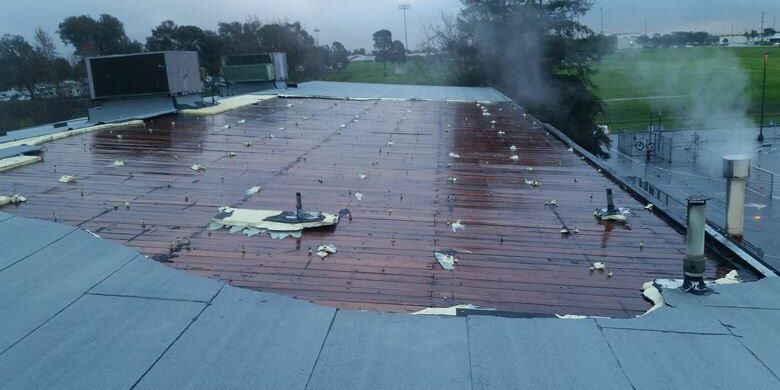In today’s competitive business landscape, maintaining a safe and visually appealing commercial property is more than just an operational necessity—it’s a strategic advantage. A vital part of this is ensuring your commercial roof is in top condition. If your roof is aging, damaged, or not energy-efficient, it may be time to consider a commercial roof replacement. Let’s explore how replacing your roof can elevate your business and optimize long-term outcomes.
Why Commercial Roof Replacement Matters
1. Enhance Building Safety
A deteriorating roof can compromise the safety of your property. Issues like leaks, mold, and structural instability can pose serious risks to employees, clients, and inventory. A new commercial roof provides a solid and secure foundation, ensuring your building meets modern safety standards.
2. Boost Energy Efficiency
Older roofing systems often lack insulation and fail to regulate indoor temperatures efficiently. By replacing your roof with energy-efficient materials, you can significantly reduce heating and cooling costs. In fact, Energy Star-certified roofing materials can lower peak cooling demand by 10-15%.
3. Improve Property Value
A new roof doesn’t just improve aesthetics; it also increases the overall market value of your property. Whether you’re looking to sell or lease, a high-quality roof is a major selling point that attracts potential buyers or tenants.
Signs It’s Time for a Commercial Roof Replacement
Knowing when to replace your roof is crucial. Here are some clear indicators:
- Frequent Repairs: If you’re constantly spending on repairs, replacement is likely more cost-effective.
- Visible Damage: Cracks, blistering, or sagging are signs of severe damage.
- Water Leaks: Persistent leaks can damage the interior and compromise the structural integrity of your building.
- Age: Most commercial roofs last 20-30 years. If yours is nearing the end of its lifespan, it’s time to plan for replacement.
Choosing the Right Roofing Material
Selecting the best roofing material is essential for durability and performance. Here are some popular options:
- Thermoplastic Polyolefin (TPO): TPO is lightweight, durable, and resistant to UV rays and chemical exposure. It’s an excellent choice for businesses looking to improve energy efficiency.
- EPDM (Ethylene Propylene Diene Monomer): Known for its durability and cost-effectiveness, EPDM roofs are ideal for flat or low-slope roofs. They’re also resistant to extreme weather conditions.
- Metal Roofing: Metal roofs are long-lasting and recyclable, making them an eco-friendly option. They’re also fire-resistant and highly durable.
- Built-Up Roofing (BUR): BUR systems provide excellent waterproofing and UV protection. These roofs are constructed with layers of tar and gravel, making them suitable for heavy foot traffic.
Benefits of Investing in Commercial Roof Replacement
- Long-Term Cost Savings: While roof replacement requires an upfront investment, it saves you money in the long run by reducing maintenance, energy costs, and potential damage repair expenses.
- Enhanced Curb Appeal: A new roof gives your building a fresh and professional look, which can positively influence client perceptions and employee morale.
- Improved Sustainability: Modern roofing materials often incorporate sustainable features such as solar reflectivity, recyclable components, and green roofing options.
- Compliance with Building Codes: Outdated roofs may not meet current building codes. A replacement ensures compliance, reducing liability risks.
Recent Statistics on Commercial Roofing
- Energy Efficiency: According to the U.S. Department of Energy, cool roofs can reduce a building’s annual energy consumption by up to 15%.
- Market Growth: The global commercial roofing market is projected to grow at a CAGR of 4.2% from 2023 to 2030, driven by increasing demand for energy-efficient and durable roofing solutions.
- Material Preference: A recent survey revealed that 45% of businesses prefer metal roofs for their durability and low maintenance.
Steps to Optimize Your Roof Replacement Project
- Conduct a Thorough Inspection: Hire a professional roofing contractor to assess the current condition of your roof. This ensures accurate planning and cost estimation.
- Choose the Right Contractor: Select a reputable roofing company with a proven track record. Look for certifications, warranties, and customer reviews to make an informed decision.
- Plan for Downtime: Minimize business disruptions by scheduling the replacement during off-peak hours or seasons. Communicate timelines and expectations with your contractor.
- Consider Future Needs: Plan for long-term requirements such as solar panel installation or additional insulation. Discuss these possibilities with your contractor.
Why Choose Surface Roofing for Your Commercial Roof Replacement
At Surface Roofing, we specialize in providing top-notch commercial roofing solutions tailored to your business needs. Our services include:
- Comprehensive roof inspections
- Expert recommendations on materials and designs
- Skilled installation teams
- Long-lasting warranties for peace of mind
We’ve helped countless businesses in Katy, TX, and surrounding areas optimize their properties with durable and energy-efficient roofs. Contact us today to schedule a consultation.
Final Thoughts
A commercial roof replacement is more than just an upgrade—it’s an investment in your business’s future. From enhancing safety and energy efficiency to boosting property value, the benefits are undeniable. By choosing the right materials and working with a trusted contractor like Surface Roofing, you can ensure your project is seamless and successful.
Don’t let a worn-out roof hold your business back. Call us now or visit Surface Roofing to get started on your commercial roof replacement journey today!







